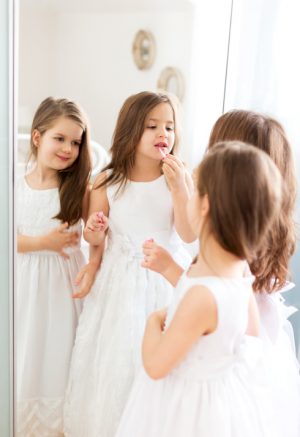How Does Pageant Culture Affect Participants’ Self-Esteem?

But my gut reaction is to feel skeptical about the ability of pageants to favorably impact self-esteem, and I tend to have a negative (though admittedly biased and inexperienced) view of pageant culture on the whole.
As somebody who teaches self-esteem workshops but lacks personal experience with pageants, I found the question about the relationship between pageants and self-esteem intriguing. Here, I share some of my thoughts regarding how pageants could potentially be harmful to the pursuit of healthy self-esteem. I remain curious to learn more about both the pros and cons of pageant culture and its impact on individuals, and I hope others will share their thoughts and experiences in the comments below.
While there are many aspects to pageants besides “beauty” (such as talent, skill, intelligence, personality, and aspiration), the focus seems to be on appearance, glitz, and glam. What is “pretty” and “in shape” has largely been defined by advertisers and the media—and by their questionable standards, the faces and bodies that tend to be the norm in pageants, whether it’s Miss America or Toddlers & Tiaras, are “ideal.” The problem with this is body image can play a huge role in self-esteem, and this intense focus on appearance can give off the impression appearance is everything.
On the contrary, appearance is only one factor among the many different qualities and traits that make us unique and beautiful. Looks are not necessarily something we have much control over. Thus, many people who may not fit the perceived ideal are susceptible to feeling inadequate, flawed, or simply not good enough.
Our society is filled with messages that tell us we should look a certain way or have a certain type of body to be accepted and desirable. The ideals portrayed in advertising and media compel us to make comparisons and fixate over whether we measure up. Pageants render the same type of pressure, along with the added elements of an actual competition and being judged.
Healthy self-esteem is about accepting yourself the way you are. It involves an ability to acknowledge you are uniquely made up of both strengths and weaknesses. It requires you to have a realistic understanding that nobody is perfect; rather, we are all diverse individuals made up of varying gifts and flaws. Healthy self-esteem includes the internalized messages “I am good” and “I am enough.”
While some pageants take into consideration other components via talent and interview categories, there is an overwhelming message that one must first and foremost be physically appealing. Participants may go to great lengths to alter or enhance their appearance. From heavy makeup, to fake eyelashes, to hair extensions, to some pretty extreme things such as plastic surgery and unhealthy dieting practices, many pageant participants engage in behaviors focused on changing themselves to become “more perfect.” The pursuit of perfection is the antithesis to healthy self-esteem.
Healthy self-esteem is about accepting yourself the way you are. It involves an ability to acknowledge you are uniquely made up of both strengths and weaknesses. It requires you to have a realistic understanding that nobody is perfect; rather, we are all diverse individuals made up of varying gifts and flaws. Healthy self-esteem includes the internalized messages “I am good” and “I am enough.”
In contrast, pageants seem to instill messages like “I should be flawless,” “I have to be thin,” and “I need to look and act a certain way to be judged favorably.” When our thought patterns include these rigid and restricting statements, we are set up to feel inadequate and ultimately terrible about ourselves. The idea we have to put so much effort into our appearance and actions to be accepted sends the message we are not good enough as is. This feeling of not being good enough or acceptable creates the foundation of insecurity and low self-esteem.
I especially worry about the effects of pageant culture and its overarching messages on young girls who may not have the resilience, maturity, or life experience to keep the competition and judging in context. If these girls are not also being taught loud and clear messages about possessing inherent worth, appreciating diversity, and understanding beauty, strength, and ability come in all shapes and sizes, they are at real risk of facing a lifetime of problems with low self-esteem, depression, and anxiety.
Perhaps children can be protected from some of the harmful messages and skewed values of pageants if their parents are countering them with healthy conversations and diverse experiences. Cynically, I’m not sure the parents who understand and strive to instill these principles are the ones interested in introducing their kids to pageant culture. But, lacking any real experience with pageant life, I may be missing some of the benefits and am open to hearing other perspectives.
© Copyright 2007 - 2025 GoodTherapy.org. All rights reserved.The preceding article was solely written by the author named above. Any views and opinions expressed are not necessarily shared by GoodTherapy.org.